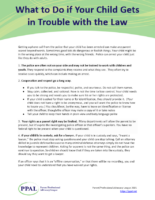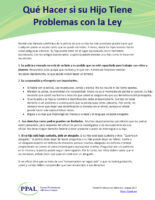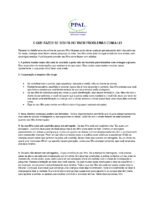Getting a phone call from the police that your child has been arrested can make any parent scared beyond words. Sometimes good kids do dangerous or foolish things. Your child might be in the wrong place at the wrong time, with the wrong friends. Police can arrest your child just like they do with adults.
- The police are often not on your side and may not be trained to work with children and youth. They respond to the complaints they receive and what they see. They often try to resolve cases quickly, which can include making an arrest.
- Cooperation and respect go a long way.
- If you talk to the police, be respectful, polite, and courteous. Do not call them names.
- Stay calm, collected, and rational. Now is not the time to lose control. Your child needs you to be strong and needs you to make sure his or her rights are protected.
- If your child is asked for their name or for identification, they should provide it. (Your child does not have a right to be anonymous, and you will want the police to know how to locate you.) You should not, by the way, have to leave an identification or license with the officer, though the officer may make a copy of it or take notes
- Tell your child to keep their hands in plain view and body language polite
- Your rights as a parent right may be limited. Many departments will allow the parent to be present, but it’s up to the investigating police officer or that officer’s superiors. You have no federal right to be present when your child is questioned.
- If your child is in custody, ask for a lawyer. If your child is in custody and says, “I want a lawyer,” the police muststop asking questions and your child can stop talking. Call an attorney skilled in juvenile defense because so many criminal defense attorneys simply do not have the knowledge to represent children. Asking for a parent is not the same thing, and the police can continue to question. So children should know that if they are taken into the custody, they should say they want to get a lawyer.If an officer says that it is an “offline conversation,” or that there will be no recording, you and your child need to understand that you have waived your rights.
- Parents shouldn’t play lawyer. Listen to your child’s story. If the child was questioned, you need to know if he or she is under investigation for a crime. In some jurisdictions, the police will tell a parent, but in most they will not. Still, it can be worthwhile to have an attorney contact the investigating officer and ask.Resist the temptation to do this yourself. Parents often hurt their child’s case–for example, by inadvertently waiving their rights. Everything your child says can be used against them in Court.As a parent, you are likely to persuade a child to say something incriminating. You will likely tell the child to tell the truth. The child is likely to say nearly anything to please you or because they are afraid, to please the police, or just to end the whole awful process. None of this helps your child.
- Communication is key. Keep an open mindabout the situation and gather as much information from everyone involved as possible. Take good notes of everything—you may need them later.The lawyer will talk with the police and, if needed, the prosecutor or child welfare lawyer. He or she may not keep you informed of these discussion. Parents should model for their child how to communicate with the lawyer and help their child request that their parent be informed and consulted.If your child is in custody, the lawyer may seek your child’s release. Sometimes it’s possible to have the child released into your custody rather than having to post bail.If your child has an IEP, or special education needs, let your child’s lawyer know. This can affect your child’s case. Sometimes children with special needs have reasons why they commit certain offenses–and that information can help with a positive resolution to the case. Be cautious about sharing this information with the police, probation and the court.
- Know what’s in the record. Remember, your child’s future may depend on the record that remains from all this. The mere fact of the arrest may stay in a state record system for a long time, affecting forever what jobs and careers the child can pursue. You can, however, ask for the records to be sealed.
Sources:
SLM Law: When Your Child Is Arrested, Know Their Rights
Forbes: 8 Hand Holding Tips If Your Child Gets in Trouble with the Law



